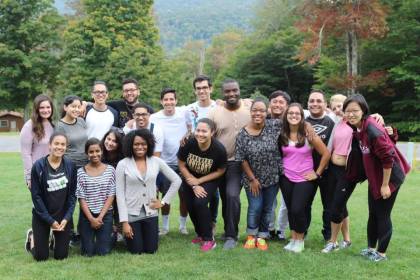By Amina Bhatti
The Office of Multicultural Affairs (OMA) is entrenching itself in racial relations at Fordham. Director Juan Carlos Matos said that OMA’s latest project is to bring a race-relations program to Fordham.
“Sometimes, the work that Multicultural Affairs does with other cultures isn’t highlighted because our work is spread out across the board rather than in a specific program,” he explained. He hopes to launch a pilot of the race-relations program next year, as the office is currently conducting research both on and off campus to collect data about what the Fordham community could expect out of such a program.
According to Matos, the idea originated when the Computing Sciences Society wanted Matos to respond to the biases formed in the general field of technology, particularly against people of color. By having a race relations program, such biases, as well as the dynamics of race on campus and in society, can be addressed. Matos pointed out that especially with the “[racially charged] climate” of today, such a program would be an important implement in addressing race.
Recent biased incidents on campus have led OMA to work toward having more dialogue, particularly “Deeper Dialogues” on race; “Deeper Dialogues” are discussions which the OMA hosts during the spring semester once a week, over three weeks on a particular topic. As a response to a racial incident that occurred on Fordham’s campus in 2012, Fordham University has implemented sessions on civility and inclusion in Freshman Core Programming. “Because we have new students entering Fordham each year,” Matos said, “we will always have the challenge of educating them… [and] assimilating them to the Fordham community”.
“What drew me to work with Multicultural Affairs… is that everyone has a story to tell and something to bring to the table,” Matos said. Whether it is a club based on collective interest in science fiction, or an LGBT support group wishing to address bias and diversity, Fordham students from all walks of life are welcome to discuss their experiences and work with OMA.
Tri M. Lam, GSB ’18 and a diversity peer-leader at OMA, describes his experience with his work: “The reason that I love OMA so much is because of the enormous openness that it provides, for both the volunteers and student bodies. With that being said, I know that I can freely and candidly express my concerns, fears or opinions to others without being criticized or confidentiality being compromised. To me, and I can say to OMA as a whole, trust is everything.”
Matos has hit many milestones as director of OMA. This is the first academic year under his leadership that OMA has been fully staffed, complete with two full-time administrators and three part-time graduate interns, as well as student workers on both campuses. With this staff, Matos said, “we can focus on more projects and be in more places at once.”
Racial and ethnic diversity, of course, have also been topics that the OMA has dealt with in various ways. “We have done movie screenings with cultural clubs and collaborated with them in bringing speakers to campus,” Matos said. OMA has also co-sponsored programs with such clubs in bringing food for cultural events. Just recently, Matos mentioned, OMA worked with the German Club of Fordham to do a movie screening.
According to the Fordham’s Office of Multicultural Affairs website, OMA seeks to honor the individuality of students at Fordham University. In doing so, OMA invariably tries to develop a hospitable climate for diversity that results from students’ unique backgrounds.

